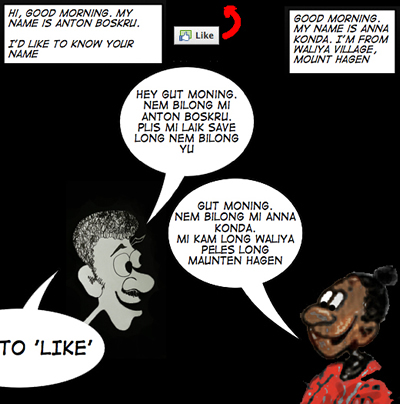Culture Contact and Language Change
 Culture contact is a key locus of language change.
Culture contact is a key locus of language change.
Where cultures meet, pidgins develop.
Pidgins are simplified languages used by groups that do not share a language.
Over time, pidgins tend to become creoles.
Creoles are stable languages that result from the mixing of other languages.
People speak pidgins as second languages but creoles as first languages.
(the illustration is Tok Pisin, a creole spoken in Papua New Guinea)
Next: Will humans one day all speak the same language?
Some interesting (but not required) stuff about English as a creole language: The idea of pidgins and creoles raises an interesting question: is English a creole? There are some good reasons to answer yes. Modern English, after all, comes from a process of culture contact between the Normand French and the Anglo-Saxons. It clearly has elements of the two languages, both in vocabulary and in structure. In addition it has some other characteristics of creoles. Compared to either Germanic languages or Romance languages it is quite simplified. For example, German has three genders, French two genders, English, none at all. Or, consider conjugation. In English, for most verbs, it's very simple, only one change (in the third person singular). So for example, I go, you go, he/she/it goes, we go, you (all) go, they go. In German, to say the same thing, you need four forms: gehe, gehst, geht, and gehen. In French, it's even more complex, six forms, two of which sound nothing like the others: vais, vas, va, allons, allez, vont. Even where English is quite irregular, it's less so than French. In English, I am, you are, he is...and then all the plural forms are "are" (we are, you are, they are). In French: suis, es, est, sommes, etes, sont. Six forms versus four. German has five. The idea that English is a creole is often called "the Middle English Creole Hypothesis." The arguments on both sides are highly technical.
English has spread around the world. A huge reason for that has been the economic and military power of English speaking people. However, another factor may be that English is simpler, easier to learn, than many other languages. Linguists debate whether or not you can ever say that one language is more difficult than another. However, the fact remains that if you are a speaker of English it takes longer to learn some languages than others. For example, the Defense Language Institute, which teaches language to the military and the diplomatic corps divides languages into four categories. Courses to learn category one languages (including French, Spanish, and Indonesian) are 36 weeks long. Courses to learn category four languages (including Arabic, Chinese, and Pashto) are 64 weeks long. Clearly, for English speakers, Arabic is a whole lot harder to learn than Spanish (and that's not just because you need to learn a new alphabet). The idea that one thing that makes English so successful its relative simplicity can't be easily dismissed.
AND, by the way, it's true that English spelling is a pain in the ass. I'm terrible at it (as you may sometimes notice). HOWEVER, our alphabet has only 26 letters. Easy! Compare the Thai alphabet: 44 consonants, 15 vowels, and 4 tone diacriticals that you have to master to write. Or the Amharic alphabet (from Ethiopia) which has 33 basic characters each of which has seven forms depending on the vowel used. Or the traditional Hebrew alphabet which had only 22 letters, but no vowels and where 5 letters are written differently if they are used at the end of a word. And, of course, the number of Chinese characters is a matter of conjecture and counting methodology. But you can read pretty much anything if you known the most common 2,600 of them. Be glad that you only have to remember things like sometimes the "f" sound is spelled "ph."
 Culture contact is a key locus of language change.
Culture contact is a key locus of language change.